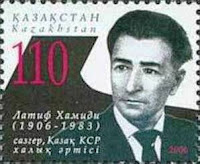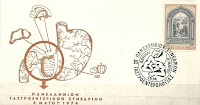Kazach Anthem Composers- Mukan Tulebayev, Eugeny Brusilovsky and Latif Khamidi on Stamps and Postcard

The national anthem of the Republic of Kazakhstan or National Anthem of the Republic of Kazakhstan was the title of the old national anthem of Kazakhstan, when it was adopted as the anthem from 1992 to early 2006. Upon independence in December 1991, the melody of the Kazakh SSR anthem, composed by Mukan Tulebayev , Eugeny Brusilovsky and Latif Khamidi , was retained; and new lyrics were adopted in 1992, written by Muzafar Alimbayev, Kadyr Myrzaliyev, Tumanbai Moldagaliyev and Zhadyra Daribayeva. On January 7, 2006, "My Kazakhstan", written in 1956, was adopted as the new anthem, with modified lyrics. We are a valiant people, sons of honor, And all we've sacrificed to gain our freedom. Emerging from malicious grip of fate, from hell of fire, We scored a victory of glory and success. Chorus: Soar high up in the sky, oh, eagle of freedom, Call up to harmony, agreement and accord! For hero's might and strength is in the nation, Just as the unity is nation's raz...





